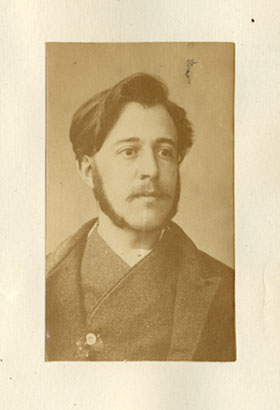
American Journal of Insanity.
Edited by medical officers of the New York State Lunatic Asylum.
Utica : State Lunatic Asylum, 1886-87.
Description : vol. XLIII., April, 1887 ; pp. 460-472, [1 l.] ; ill., 1 plate, 23 cm.
Photograph : 1 albumen mounted on card stock.
Photographer : unknown.
Subject : Mental Disorders — Psychogenic Amnesia.
Notes :
Overview :
Psychogenic amnesia — sudden loss of memory in the absence of any causative organic brain disease and accompanied with an awareness by the patient of the loss. Typically, amnesia is localized and lasting only a few hours whereas the generalized form can last for years. Approximately 1000 cases have been documented since it was first described by Charcot in 1877 (Lešons sur les maladies du systeme nerveux faites, Delahaye & Lecrosnie). By the late 1800's and primarily through the work of Freud, traumatic amnesia was recognized as a form of conversion disorder. This group classification displaced the less specific term, "hysteria," which did not distinguish for the psychogenic characteristic of these disorders.

Subject was "unknown" when he was photographed. The image was widely circulated to police departments in the metropolitan area but his identity remained a mystery from the time of his admittance at the asylum on July 31, 1886 to November 18, 1886. How this disturbed young man arrived at the reconstitution of his memory is a crucial point of this paper and set a precedent for the aggressive treatment of traumatic amnesia, described by Davies in the following passage on page 468 :
The iodide of potassium had done no good so was discontinued, and his general health improved by ordinary tonics. He became more and more abusive in his language to me, and a belief he was malingering got firm possession of my mind. In the infirmary he was very comfortable, had every want anticipated, and nothing whatever to disturb or annoy him. His food had been regulated, and contained many delicacies. I determined to alter this, and to let him try a thorough change. I directed accordingly that he should be taken to the least pleasant ward in the asylum. The majority of the inmates of this ward are not desirable associates, and in every way his surroundings were as unpleasant as it lay in my power to make them. For the first day after this change he did not speak at all. The next day, he said he was ill. I carefully examined him, and could detect nothing wrong anywhere. I spoke to him very strongly, and made him understand I did not believe his statement that he had forgotten his name. He begged very hard to be sent back into the infirmary, but I insisted that no change could be made until I knew his name and the address of his friends. At this he became insolent and talked such a lot of rubbish I left him, not however, without saying he had played out his game, and had better give in.
It is not clear that Davies is using "malingering" in any sense approaching today's clinical definition of the word. Forensic tools such as the TOMM (Test of Memory Malingering) were not available to asylum directors in the mid-nineteenth century at a time when a considerable amount of money and political will was spent to improve mental asylums, especially in England. There must have been more than a few pretenders and criminals petitioning for sanctuary at the Kent and "patient L." was found by the police with a formidable dagger, drawing suspicion to his character. However, the factitious criminal will exhibit no concern over a memory loss, in contrast to the acute distress suffered by L. and chronicled by Davies. Several examples from a desperate letter campaign L. intiated to recover his identity are provided, including a long entreaty sent to a Londoner who turned out to be a protector when he was orphaned as a boy.
Today psychogenic amnesia is still treated aggressively, and once any structural brain disease can be eliminated, somatic therapy can include both chemical and electroshock treatments when psychotherapy fails. Occasioned by his training as a skeptic, Dr. Davies chanced upon a crude but effective treatment for amnesia.
